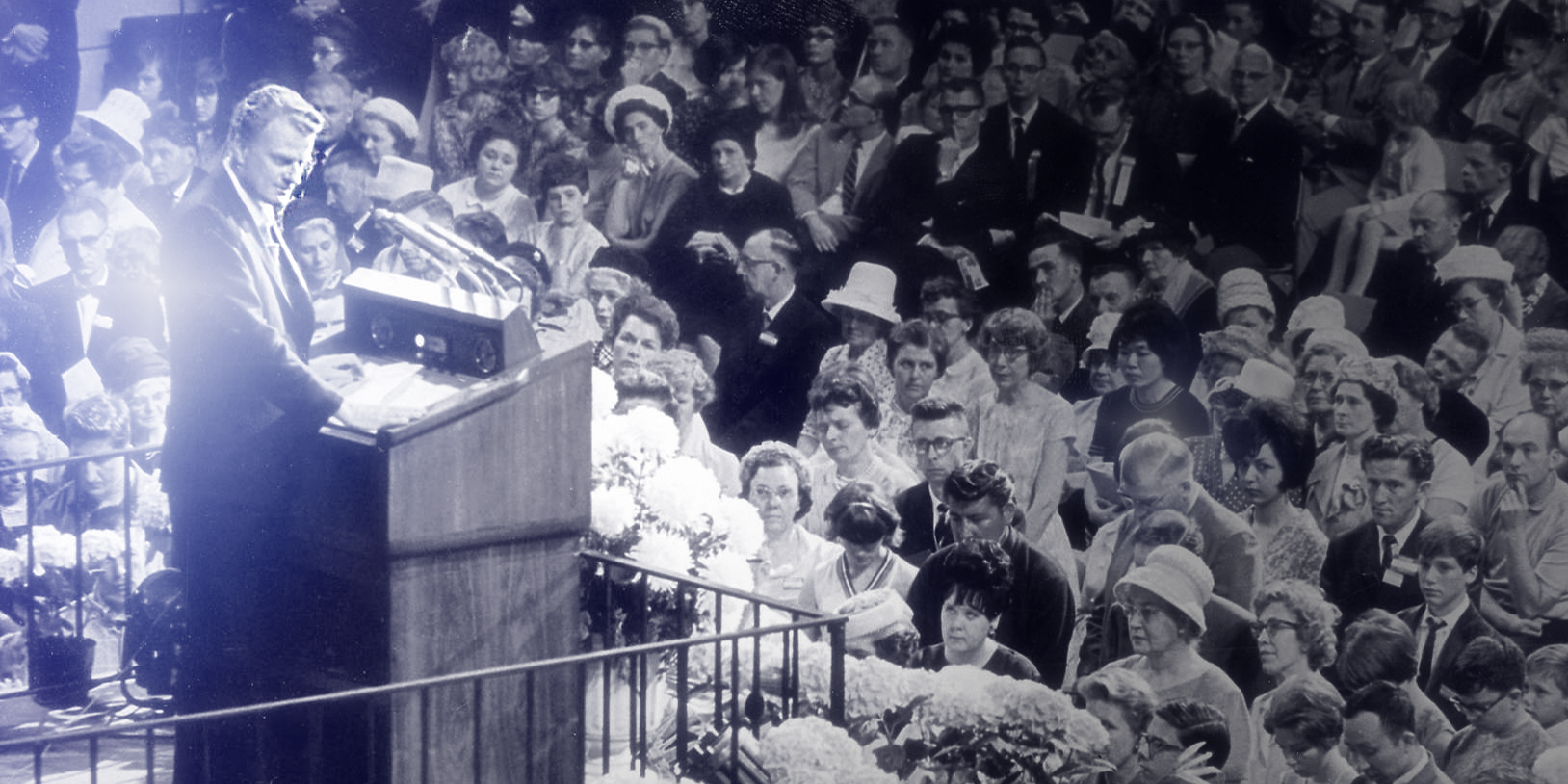
In late August of 1960, the most famous theologian in the world met with the most famous evangelist in the world. Billy Graham, at that time just 42 years old and already a household name, held two crusades in Karl Barth’s hometown of Basel, Switzerland. Before the crusades kicked off, Graham and Barth spent a day together. We don’t have a record of their conversation, but the elderly Barth walked away from their meeting with a favorable impression of Graham.
This high regard, however, was short-lived. At Graham’s invitation, Barth attended one of the crusades at the nearby St. Jakob Stadium. Hearing America’s Pastor preach, the Swiss theologian was horrified, but not by the fires of hell. Later speaking to a group of pastors, Barth remarked:
That [Graham’s crusade] was not the Good News, it was pistol-shooting. An urgent appeal was made to the people: You must, you should! … It was a proclamation of the Law, not a message to make one happy. He wanted to terrify people. People would always much rather be terrified than be made joyful.
Barth took issue with the way Graham laundered threats and demands as gospel. To Barth, Graham’s preaching made conversion to Christianity into something like a shotgun wedding. Hold their feet over the fires of hell just long enough for them to say the vows and get saved.
But the emotional demand of Graham bothered Barth just as much as its content. The goal of Graham’s presentation (at least as Barth heard it in Basel) was fear, a fear meant to coerce one into a decision rather than entice them toward God.

It is the law that says, “do this and you will live” (Lev 18:5) — a promise that simultaneously whispers, “If you don’t, you’ll die.” However large or small the demand, the choice is anything but simple when the stakes are eternal life. What intends to inspire and motivate actually evokes fear and anxiety. By contrast, the gospel is not another requirement, but good news — an unconditional announcement with no threats or strings attached. Joy, Barth believed, was the beginning of faith.
The distinction between law and gospel draws a distinct emotional profile, having just as much to do with how the words are received as the words themselves. This is perhaps one reason why the disposition of grace is just as important as the doctrine itself. Talking about grace in a way that stirs up combative resentment, bitterness, or self-righteous indignation undermines the message itself. Or in Billy Graham’s case, over-emphasizing the urgency of the gospel turns a promise into a threat.
Proclamation becomes gospel when it produces an emotional response of joy. The early church theologian Origen of Alexandria likewise connected pronouncement with its response, defining the gospel as: “Speech announcing events that, rightly and because of the benefits they bring, bring joy to the hearer when the announcement is received.” Where the gospel is, joy is sure to follow. How beautiful, indeed, are the feet that bring good news.
Joy seems rare nowadays. Perhaps that’s too much of a generalization, or anecdotal, or both. But I’d venture to guess that at least some of the much-discussed feelings of languishing or indifference has something to do with the kind of news we hear day in and day out. There are plenty of reasons to not be joyful, to be sure, but the emotional architecture we inhabit trades in rises in blood pressure: “Uncertainty in the markets,” “They’re hiding the truth,” and “Arctic blast threatens weekend,” to name a few recent headlines. We are saturated in fear and anger. Writing to the church in Galatia, the apostle Paul argued that the emotional fruits of the devil are discord, anger, dissension, and jealousy. He probably didn’t have podcasts and clickbait news articles in mind, but he might as well have.
The most effective rhetoric aims squarely at the heart. Give someone new information and it might spark their interest; make them angry and they will start a war. This is not a new phenomenon, of course, though perhaps it’s felt more acutely nowadays (to say the least). The greater the indignation, the higher the anxiety, the more clicks, shares, likes, and votes generated. Perhaps we enjoy the thrill too, as the algorithms suggest.
Whether in Barth’s time or today, the church can feel as joyless as the news. We observe penitential seasons reveling in minor keys that never resolve. The celebratory feast of our redemption (communion) usually feels more like a somber rite of spirituality. And while most preachers might not mimic Graham’s message or style, there’s still plenty of fear and anger to go around.
The gospel is for the life of the world, but it’s not the kind of business that trades in fear, outrage, or despair. The emotional architecture of faith has joy as its foundation, with rooms filled by love, peace, and gratitude (to name a few). It is a place where heavy burdens are laid down and where sorrow and remorse are turned to dancing. Our redeemer still lives, and there is nothing that can separate us from his love. As hard as it might be for us to imagine, Christian faith looks more like a house party than a debating chamber or comment thread. It looks more like the spontaneous outburst of laughter at a joke than the panic of a shotgun wedding.

COMMENTS
One response to “Pistol Shooting From the Pulpit”
Leave a Reply













[…] hypocrisy, but given that the Mockingbird site has become a sort of virtual safe house for folks burned by megachurch mismanagement and hypocrisy, I almost feel it would be odd to completely ignore the […]